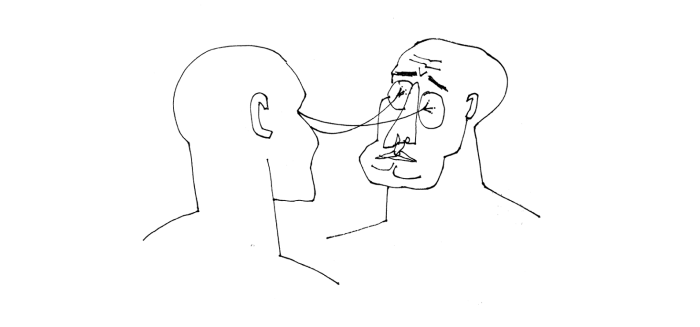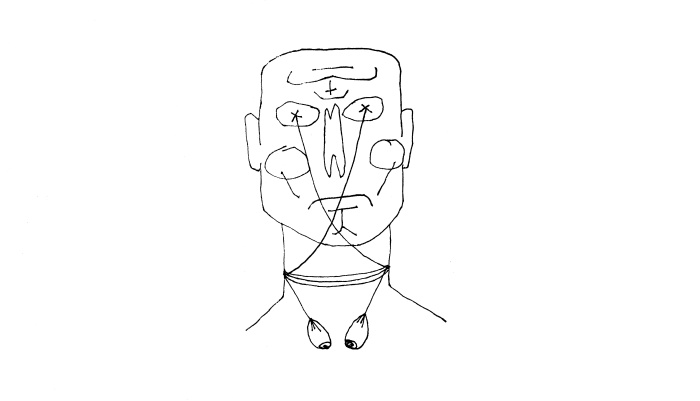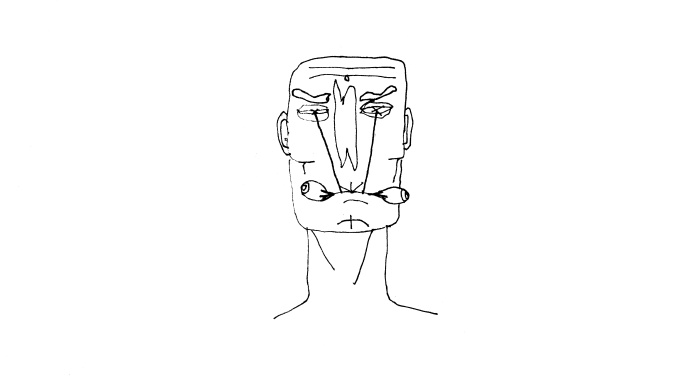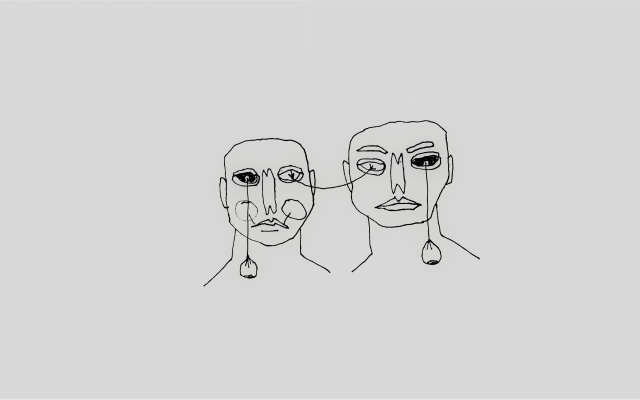"They tell me
that somewhere -
in Brazil, most probably -
there is a really happy man."
(Vladimir Mayakovsky, A Tragedy)

Bez tytułu, 2018. Autor: Roberto Bellini. Dzięki uprzejmości artysty
As I get up from my desk, e-mail inbox still failing to reload, I walk to the kitchen like a little kid who’s about to steal a can of condensed milk from the pantry, heart pumping with expectation, the risk of being caught almost as unbearable as the urge to gulp some of the sweet white ooze. They’re not far from each other (my desk and the kitchen) and that’s fortunate because I don’t have enough time to think about my life along the way.
The bugs who’ve arrived in my apartment before today’s tropical storm still accompany me. This morning, a spider made its way into my toilet trash can and I decided to leave it there, alive, lid on. Two months ago, a dozen ladybugs were circling the chandelier and having sex over my head. They brought me good luck – the next day, I met a wealthy guy who seemed to enjoy my company to the point of paying for me on a night out in Belo Horizonte’s most expensive strip club.
I open the kitchen cabinet to find three robust jars of lacto-fermented vegetables and then make an rheumatoid effort to bring the jars to the table. I open them one by one, and they stink beyond belief. The sour smell is still unpleasant to me, albeit enticing in a decayed, renegade way. I can’t tell if any of the vegetables are rotten. (Pessimistically, I assume they all are.) In Minas Gerais, eating fermented foods is an allegorical taboo. Our obsession with cleanliness doesn’t give the mystery bacteria a chance to wreak havoc on our guts.

Bez tytułu, 2018. Autor: Roberto Bellini. Dzięki uprzejmości artysty
When someone writes about a land, especially his own, he must play both the coward and the hero. He must do it viciously and fast, without thinking too much, aiming solely at achieving a syncretic concoction that has minimal odds of tasting pleasant or even palatable to his fellow countrymen and outsiders. His bowl, filled with a confusing jelly-like substance, must be held confidently, though it may render itself useless and end up wasting everyone’s time and patience.
Such is the Mineiro way: wasting other people’s time as much as possible, either as a means of resisting impositions, gathering information, evading too much questioning, or confessing the reason behind such dismal behavior. Of course, one must firstly convince the interlocutor that there is always time to be wasted; that there is always time for chatting, for joking, for walking, for gossiping, for drinking, for nothing.
The Mineiro has to feign a nice and sympathetic demeanor to Brazilians and foreigners alike because he can’t deny the pathological famacide within. There is nothing that the Mineiro enjoys more (or is less able to resist) than patiently observing others in order to mercilessly criticize them later. Of course, this is not a behavior exclusive to the people from Minas Gerais, but Mineiros tend to do it with grace, with some measure of dignity and the assertiveness that only a certain degree of peace of mind can ensure. Outrageous as it may sound, Mineiros are very, very respectful of the people they criticize after wasting much of their time.
This may be an evolution from the familiaricide in commutatione eius possessio that has set Minas apart from the rest of the country since the first decades of its existence. In the face of pornographic amounts of gold, the unfathomable greed of the bandeirantes1 drove several of them to kill their counterparts, who happened to be their closest friends. During these times, wiping out an entire family (and stealing its possessions) was at its most profitable. Of course, this inclination became subtler, more psychological than factual, but it gradually shaped the characteristic Mineiro suspicion – a reluctance to trust those that are close to us as being strong, or stronger, than the reluctance to trust others.
A fortuitous cliché: discovering gold in abundance is much less of a blessing than a curse. It tends to inaugurate endless cycles of hope and frustration. In Minas, it began with the establishment, in Ouro Preto, of an intellectual elite whose baroquian and secretive tendencies never let it accomplish much collectively. It slowly configured a mental landscape that centuries later still impregnates self-deprecation in a diligent fashion. Despite being regarded as competent and committed, the Mineiro continues to fail his family, friends, and broader concentric circles of relationships. At least in his own mind.

Bez tytułu, 2018. Autor: Roberto Bellini. Dzięki uprzejmości artysty
Mineiro heroes usually perish alone by the end of the narrative, their quest for freedom constantly undermined by cultural conservatism and the aforementioned suspicion. Positivity is buried under layers and layers of goldless wasteland, eventually showing up in the metaphysical plane, in the form of Kardecist reincarnation or through a life of conformity and bovine following of long-established traditions. As Guimarães Rosa 2 describes:
(The Mineiro’s) thoughtful and sparing features, the seriousness and interiorization that the mountain induces—compartmentalizing, distancing, isolating, difficult. His liking for money in the abstract. His distrust and caution—since there were clusters of policemen, secret agents, bureaucrats, tax collectors, troops and escorts, prosecutors and spies, grinding, devastating, collecting, intriguing, punishing, taxing, uncovering evasion, shamelessness, contraband, or loss of gold and diamonds, and who grimly summoned the power of the state, a perennial danger to those watchful people who had to learn how to hide. His honest winding cunning, of highlander streamlet, of masters in passive resistance. His inhibited manners, of men imprisoned in foggy mornings, and foggy nights of sad cities, between religion and collective rule, austere, men of cloaked souls, though urbane and polite.3
Located in the heart of Brazil, Minas Gerais is nowadays a placid place for truck drivers to stop and have coffee. A place where anger is frowned upon unless you’re part of a privileged few. A place where cattle thrive and nothing significant is likely to happen. Nevertheless – or because of that – some global companies have recently established themselves here, taking advantage of our secretive culture. Such is the case of ******, with its gigantic four-story office on top of a commercial building in Minas’ capital Belo Horizonte. It is their only *********** office in Latin America, but no one in the city seems to know much about it. After signing a non-disclosure agreement that I am probably infringing, I was assigned the job of writing four promotional videos about the office. When they were ready to be exhibited, I was told that they would only be shown to employees and visitors. I would never be able to show them to anyone without infringing the contract, I would never be able to say I did this job, I might just forget it altogether, secretively, bovinely, like a good Mineiro. At least, they paid me on time, unlike Mineiros are used to.
But this passive attitude ends up fermenting inside the jars of abidance. The state of mind has radically changed from that of the mid-2000’s, when the country experienced another of its short-lived economic booms and was catapulted, as a member of the BRICS, to the role of soon-to-be world player. It looked as if the “country of the future,” an abhorrent expression coined by Stefan Zweig in 1941 and relentlessly hammered into our heads for almost 80 years now, was finally about to become the “country of the present.” Despite the optimism, once again, the dream sank as an overripe jackfruit falling into water: tropical hope, sinking frustration.

Bez tytułu, 2018. Autor: Roberto Bellini. Dzięki uprzejmości artysty
The Mineiro observes yet another cycle unfold and avoids talking about it. There’s nothing new: he lived it over and over. He does not intend to draw philosophical conclusions. Otto Lara Resende,4 one of the self-proclaimed “four Mineiros of an intimate apocalypse” (a group that also included Fernando Sabino, Paulo Mendes Campos, and Hélio Pellegrino), came up with some particularly witty aphorisms that captured the true spirit of the land. His most notorious one, “Mineiros are only supportive in cancer,” is undoubtedly catchy and grim, but by no means the most comprehensive. With the uncompromising and critical spirit of the true coward-hero of the late 20th century, Otto achieved more through his first-thought-best-thought insights about Minas than most historical or sociological approaches.
“Ambushing is the greatest contribution of Minas Gerais to universal culture.”
“In Minas Gerais, people don’t say precaution, they say pre-precaution.”
“Minas Gerais can always be found where it was.”
Jars of lacto-fermented vegetables can also be found where they were. Nobody is ever likely to open them or taste what’s inside. I make another rheumatoid effort to take the jars back to the kitchen cabinet, but it’s difficult not to think about my life as I do it. These jars will explode in my face and splatter all over the floor. I’m far from being the only Mineiro who is frankly, admittedly, despairing over the current fermenting extreme, which is certainly smellier than it’s ever been. Maybe the cycle has been suspended. Maybe the curse succumbed to the most sinister of situations: the strangling of hope beyond hope, the death of the positive half.
Long gone are the ladybugs. Current visitors include mosquitoes who silently trade yellow fever, dengue, zika, and chikungunya between them. These bloodsuckers carry the weight of a status quo of powerful elites who have suddenly woken up during their funeral, vomiting a river of mud over the attendees, reinstating the nausea of living among inequality and demanding that we emaciate our consciences in order to withstand the prospect of desperately poor people living in desperately poor conditions with absolutely no hope.
For now, the thunder is mute as is the forward swing of hope in the land without evil’s5 humor. Perceived syncretic virtues are epiphenomena. Having failed to come to terms with its own material, philosophical, and metaphysical paradoxes, Minas Gerais has successfully resorted to the obscure exceptionality of ‘pataphysics. Not as a trend, not as an attempt of denial or redemption. It’s been a while since Campos de Carvalho6 declared his love for the night but confessed sleeping with his sleeping pills. It’s also been a while since Affonso Ávila7 concluded that Mineiros never conclude.
BIOS
Guilherme Lessa is a writer, editor, playwright, screenwriter, and translator from Belo Horizonte, Brazil. Born in 1978, his works include plays, films, and an upcoming series about youth, sexuality, and social frailty in Brazilian suburbs. Creative and content consultant for museums such as the Inhotim Institute in Brumadinho and the Museum of the Inconfidence in Ouro Preto, Lessa also works with interactive storytelling, 3D/video mapping, and video scenography. www.guilessa.com
Roberto Bellini is a visual artist born in Juiz de Fora, Brazil. With a rigorous formal approach, Bellini’s works use references of the Brazilian landscape, mythology, and psychology to establish dialogues with the traditions of art, primitivism, photography, and the moving image.
* Cover photo: no title by Roberto Bellini, 2018. Courtesy of the artist.
[1] 17th-century fortune hunters who hailed from the São Paulo region, then known as Captaincy of São Vicente, the bandeirantes penetrated the interior of Brazil in search of wealth. Their expeditions were called “bandeiras” (Portuguese for “flags”) and usually comprised of slaves (to carry provisions, clothes, etc.), indigenous people (to show the way), and dogs (to smell and bark).
[2] João Guimarães Rosa (1908–1967) is widely regarded as the most important Brazilian novelist of the 20th century. Born in Cordisburgo, a small rural town in central Minas Gerais, Rosa was the author of classics such as “Sagarana” and “Grande Sertão: Veredas.” He is mostly recognized by his ability to address popular speech through high literature.
[3] From “Aí está Minas: a mineiridade” (or “Presenting Minas: the Mineiro”), by João Guimarães Rosa, originally published in the magazine, O Cruzeiro, on 25 August 1957.
[4] Otto Lara Resende (1922–1992) was a Brazilian writer and journalist born in São João Del-Rei, Minas Gerais.
[5] Reference to Pindorama, the Tupi-Guarani mythical land without evil, which designates the Atlantic South American coastline that was reached by the Tupi and Guarani indigenous people. Pindorama is also how some Andean and other South American tribes still refer to Brazil. The mention of the muted thunder relates to Tupã, a word that means both “god” in a general sense and “the vocal manifestation of god” (thunder).
[6] Walter Campos de Carvalho (1916–1998) was a Brazilian writer born in Uberaba, Minas Gerais, who didn’t receive much attention from his contemporaries but has been progressively enjoying a surge in popularity and critical praise.
[7] Affonso Ávila (1928–2012) was one of the most important Brazilian contemporary poets. He was born and died in Belo Horizonte, Minas Gerais.



